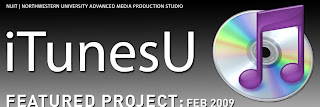
21st Century Student? Is there a need for a teacher for a networked student? Am I prepared to be a networked teacher?
Ms. Drexler provided a very interesting way of describing exactly what a networking student does.
I have to say that I do think that teachers will always be necessary. I do not think that lectures should be extinct, nor classroom time should be diminished. However, I do like the idea of the student learning research on a different level. I like the idea of teaching students to find valuable information on the web, versus trusting the first sight that you come across. "Digging Deeper" is a great way to teach students to be successful later on in life.
I do think there should be more to a teacher than teaching a student how to network. This is pretty much a personal opinion, but I enjoy having classroom lectures sometimes, and I enjoy discussions because they help me retain more information and understand it on a different level - especially if I could relate to it. I think taking those times in the classroom and applying it to research or networking could be beneficial.
This kind of relates back to the video that we watched a few weeks ago - textbooks are bought and not read, lots of money is paid for a class that students receive nothing from - but that does not mean that it should all be extinct. The method could change, but the principal could stay the same, in my opinion.
I am ready to be a teacher who teaches my students to dive in for information, and to keep diving after one little nugget. I want to teach them to succeed after the hour in the classroom that they have.






